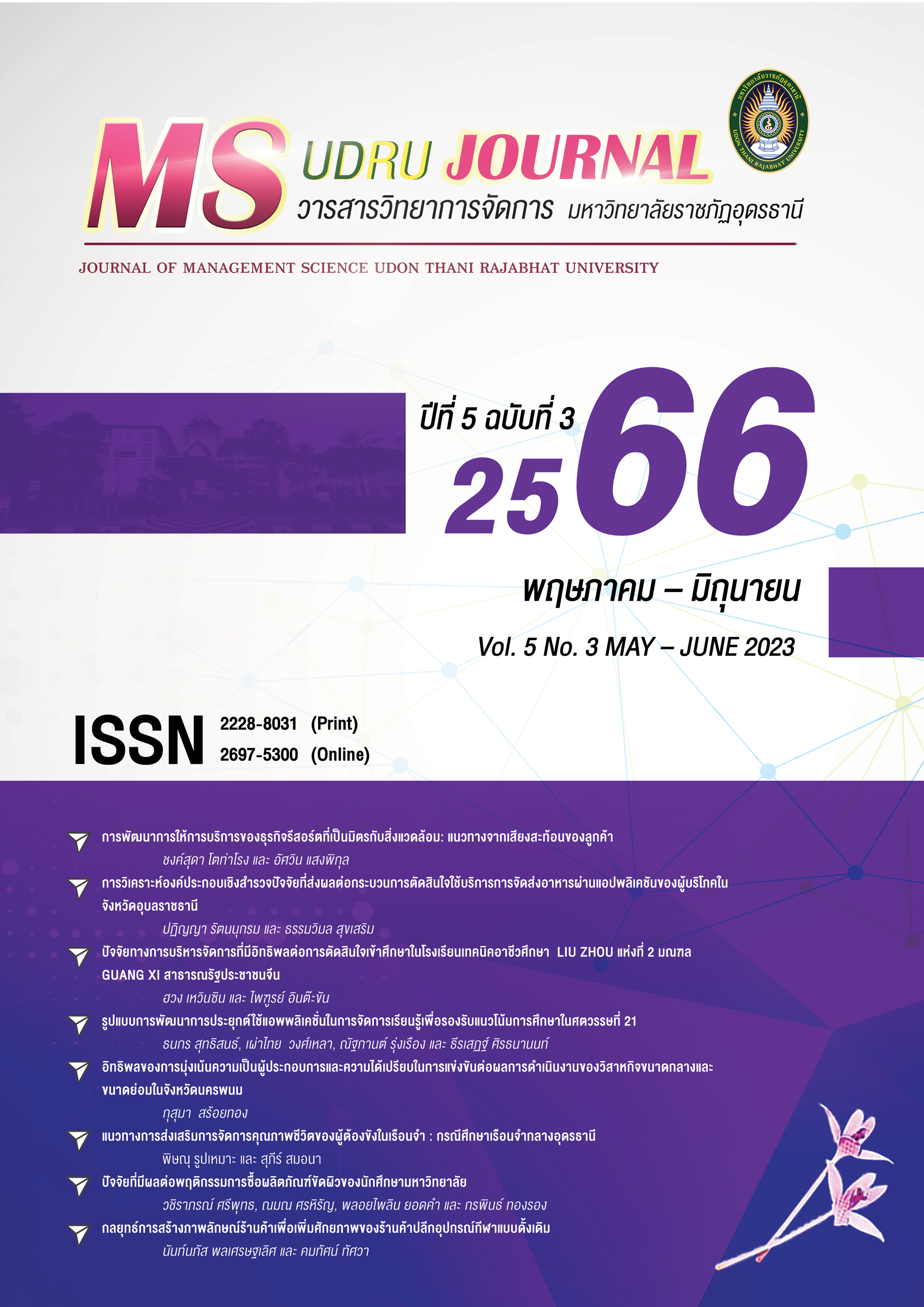รูปแบบการพัฒนาการประยุกต์ใช้แอพพลิเคชั่นในการจัดการเรียนรู้เพื่อรองรับ แนวโน้มการศึกษาในศตวรรษที่ 21
Main Article Content
บทคัดย่อ
การวิจัยครั้งนี้มีวัตถุประสงค์เพื่อ 1) ศึกษาสภาพปัญหาและความต้องการในการประยุกต์ใช้แอพพลิเคชั่นที่เกี่ยวข้องกับการประชุมทางไกลในการจัดการเรียนการสอนออนไลน์ 2) พัฒนารูปแบบการพัฒนาการประยุกต์ใช้แอพพลิเคชั่นที่เกี่ยวกับการจัดประชุมทางไกลในการจัดการเรียนการสอนออนไลน์ 3) ทดลองใช้รูปแบบการพัฒนาการประยุกต์ใช้แอพพลิเคชั่นเกี่ยวกับการประชุมทางไกลในการจัดการเรียนการสอนออนไลน์ และ 4) ประเมินผลผลสัมฤทธิ์รูปแบบการพัฒนาการประยุกต์ใช้แอพพลิเคชั่นเกี่ยวกับการจัดประชุมทางไกลในการจัดการเรียนการสอนออนไลน์ ของสถานศึกษาระดับมัธยมศึกษาในเขตพื้นที่ จังหวัดอุบลราชธานีดำเนินการวิจัยโดยใช้ระเบียบวิธีการวิจัยและพัฒนา (Research and Development) ทั้งหมด 4 ระยะ โดยระยะที่ 1 ศึกษาสภาพปัญหาการใช้และความต้องการ โดยใช้การวิจัยเชิงคุณภาพ และเชิงปริมาณซึ่งแบบสอบถามที่ใช้ในการวิจัยมีความเชื่อมั่น 0.95ระยะที่ 2 พัฒนารูปแบบการพัฒนาการประยุกต์ใช้แอพพลิเคชั่นในการจัดการเรียนการสอนออนไลน์ โดยใช้การวิจัยเชิงคุณภาพ ระยะที่ 3 ทดลองใช้รูปแบบการพัฒนาการประยุกต์ใช้แอพพลิเคชั่นในการจัดการเรียนการสอนออนไลน์ โดยใช้การวิจัยเชิงทดลอง และระยะที่ 4 ประเมินผลสัมฤทธิ์ของรูปแบบการพัฒนาการประยุกต์ใช้แอพพลิเคชั่นในการจัดการเรียนการสอนออนไลน์ โดยใช้การวิจัยเชิงคุณภาพ และเชิงปริมาณ ผลการวิจัยพบว่า บุคลากรครูมีการประยุกต์ใช้แอพพลิเคชั่นที่เกี่ยวข้องกับการประชุมทางไกลในการจัดการเรียนการสอนออนไลน์อยู่ ในระดับปานกลาง และมีความต้องการในการพัฒนาการประยุกต์ใช้แอพพลิเคชั่นสำหรับการจัดการเรียนการสอนออนไลน์ในระดับมาก ด้วยค่าเฉลี่ย 2.95 และ 3.61 ตามลำดับ รูปแบบการพัฒนาการประยุกต์ใช้แอพพลิเคชั่นในการจัดการเรียนการสอนออนไลน์ มีส่วนประกอบสำคัญ 6 ส่วน คือ 1) หลักการและเหตุผล 2) วัตถุประสงค์ 3) องค์ประกอบ 4) กระบวนการพัฒนา 5) ระยะเวลา 6) การประเมินรูปแบบ หลังการเข้าร่วมโครงการพัฒนาตามรูปแบบการพัฒนาการประยุกต์ใช้แอพพลิเคชั่นในการจัดการเรียนการสอนออนไลน์ บุคลากรครูมีคะแนนผลสัมฤทธิ์ด้านความรู้ความเข้าใจในประยุกต์ใช้แอพพลิเคชั่นสำหรับการจัดการเรียนการสอนออนไลน์ สูงกว่าก่อนเข้าร่วมโครงการอย่างมีนัยสำคัญทางสถิติ ที่ระดับนัยสำคัญ 0.05 และมีความพึงพอใจต่อการเข้าร่วมโครงการโดยภาพรวมในระดับมากที่สุด ด้วยค่าเฉลี่ยเท่ากับ 4.60 และผลการพัฒนาบุคลากรตามรูปแบบการพัฒนาการประยุกต์ใช้แอพพลิเคชั่นในการจัดการเรียนการสอนออนไลน์บรรลุผลสัมฤทธิ์ตามวัตถุประสงค์ที่ตั้งไว้ โดยบุคลากรครูมีความรู้ความเข้าใจในการประยุกต์แอพพลิเคชั่นสำหรับการจัดการเรียนการสอนออนไลน์โดยภาพรวมในระดับมาก มีค่าเฉลี่ยเท่ากับ 3.97 และมีความสามารถในการประยุกต์ใช้แอพพลิเคชั่นสำหรับการจัดการเรียนการสอนออนไลน์โดยภาพรวมในระดับมาก มีค่าเฉลี่ยเท่ากับ 4.11
Article Details

อนุญาตภายใต้เงื่อนไข Creative Commons Attribution-NonCommercial-NoDerivatives 4.0 International License.
บทความที่ได้รับการตีพิมพ์เป็นลิขสิทธิ์ของคณะวิทยาการจัดการ มหาวิทยาลัยราชภัฏอุดรธานี
ข้อความที่ปรากฏในบทความแต่ละเรื่องในวารสารวิชาการเล่มนี้
ไม่ใช่ความคิดเห็นและความรับผิดชอบของผู้จัดทำ บรรณาธิการ กองบรรณาธิการ และคณะวิทยาการจัดการ มหาวิทยาลัยราชภัฏอุดรธานี ความรับผิดชอบด้านเนื้อหาและการตรวจร่างบทความแต่ละเรื่องเป็นความคิดเห็นของผู้เขียนบทความแต่ละท่าน
เอกสารอ้างอิง
กฤติยา อริยา, วารีรัตน์ แก้วอุไร และ เพ็ญพิศุทธิ์ ใจสนิท. (2559). การพัฒนารูปแบบการเรียนการสอนตามแนวคิดการจัดการเรียนการสอนที่เน้นความแตกต่างระหว่างบุคคลเพื่อส่งเสริม ความสามารถในการออกแบบการจัดการเรียนรู้ในศตวรรษที่ 21 สำหรับนักศึกษาครู มหาวิทยาลัยราชภัฏ. วารสารมหาวิทยาลัยราชภัฏลำปาง, 5(2), 1–17.
ถาวร เส้งเอียด และคณะ. (2552). สภาพ ปัญหา และความต้องการในการพัฒนาตนเองของครูและบุคลากรทางการศึกษาในจังหวัดราชบุรีและสมุทรสงคราม. วารสารศึกษาศาสตร์ มหาวิทยาลัยขอนแก่น, 34(3-4), 108-116.
ธิดา แซ่ชั้น และณรงค์ สมพงษ์. (2561). การพัฒนาแบบจำลองการเรียนการสอนบนเว็บโดยใช้ปัญหา เป็นฐาน เพื่อส่งเสริมการรู้ดิจิทัลสำหรับนักศึกษาปริญญาตรี. วารสารสารสนเทศศาสตร์, 37(2), 22–43.
ธีรเสฏฐ์ ศิรธนานนท์. (2561). การประยุกต์ใช้ Application Zoom เพื่อเพิ่มประสิทธิภาพในการเรียนรู้ด้านสาธารณสุข. วารสารพลศึกษา, 21(2), 1-10.
ปริวัตร เขื่อนแก้ว และ ทิพรัตน์ นพฤทธิ์ (2559). การพัฒนารูปแบบการจัดการเรียนรู้ที่สอดคล้องกับผู้เรียนในศตวรรษที่ 21 เพื่อส่งเสริมการคิดเชิงสถิติของนักศึกษาในระดับอุดมศึกษา. วารสารมหาวิทยาลัยฟาร์อีสเทอร์น, 10(3), 81-90.
ไพฑูรย์ สินลารัตน์. (2558). ปฏิรูปการเรียนรู้: ปฏิรูปการศึกษากลับทางจากล่างขึ้นบน. กรุงเทพฯ: พี.เอ.ลีฟวิ่ง.
มลฤดี แซ่แต้. (2563). รายงานผลการสำรวจความพร้อมในการจัดการเรียนการสอนออนไลน์ของอาจารย์มหาวิทยาลัยสงขลานครินทร์ วิทยาเขตภูเก็ต. รายงานการวิจัย. มหาวิทยาลัยสงขลานครินทร์.
ศักดิ์ชัย ยอดมีกลิ่น และคณะ. (2560). ความพึงพอใจต่อการฝึกอบรมและประสิทธิภาพของการ ฝึกอบรมหลักสูตรเพื่อการพัฒนาครูและบุคลากรทางการศึกษาทั้งระบบ ประจำปี งบประมาณ 2560 กรณีศึกษา : หลักสูตรการพัฒนาการเรียนการสอนโดยใช้เทคโนโลยีเป็นฐาน. วารสารงานประชุมวิชาการระดับชาติครั้งที่ 5 “นวัตกรรมและเทคโนโลยีเพื่อ คุณภาพชีวิตและสังคมที่ยั่งยืน”, 5, 141-155.
สำนักงานเขตพื้นที่การศึกษามัธยมศึกษาอุบลราชธานี อำนาจเจริญ. (2564). ระบบสารสนเทศเพื่อ บริหารการศึกษา. สืบค้นเมื่อ 10 สิงหาคม 2564, จาก http://www.secondary29.go.th/.
สำนักงานสภานโยบายการอุดมศึกษา วิทยาศาสตร์ วิจัยและนวัตกรรมแห่งชาติ. (2562). บทวิเคราะห์อันดับขีดความสามารถในการแข่งขันของประเทศไทยด้านโครงสร้างพื้นฐานทางวิทยาศาสตร์และด้านการศึกษา ประจำปี 2562 จากรายงาน IMD World Competitiveness Yearbook 2019. กรุงเทพฯ: กระทรวงอุดมศึกษา วิทยาศาสตร์ วิจัยและนวัตกรรม.
อมรรัตน์ เตชะนอก,รัชนี จรุงศิริวัฒน์ และพระฮอนด้า วาทสทฺโท. (2563). การจัดการศึกษาในศตวรรษที่ 21. วารสารมหาจุฬานาครทรรศน์, 7(9), 1-14.
อาณัติญาณ์ ศิริวัฒนอธิรกุล. (2554). ความต้องการพัฒนาตนเองของครู ในสถานศึกษาขั้นพื้นฐานสังกัดสำนักงานเขตพื้นที่การประถมศึกษาสงขลา เขต 2. วิทยานิพนธ์ปริญญาการศึกษา มหาบัณฑิต มหาวิทยาลัยทักษิณ สงขลา.
อาภรณ์ รัตน์มณี. (2553). ทำไมระบบการศึกษาไทยจึงพัฒนาช้า. สืบค้นเมื่อ 10 สิงหาคม 2564, จาก https://www.mcu.ac.th/article/detail/448.
อินทิรา ชูศรีทองและคณะ. (2563). รูปแบบการพัฒนาครูในการใช้เทคโนโลยีสารสนเทศและการสื่อสารเพื่อการจัดการเรียนรู้ในโรงเรียนประถมศึกษา สังกัดสำนักงานศึกษาธิการภาค 11. หนังสืออิเล็กทรอนิกส์, 10(2), 98-112.
Darici, D., Reissner, C., Brockhaus, J., & Missler, M. (2021). Implementation of a fully digital histology course in the anatomical teaching curriculum during COVID-19 pandemic. Annals of Anatomy - Anatomischer Anzeiger, 236, 151718.
Dishon, G., & Gilead, T. (2021). Adaptability and its discontents: 21st century skill and the preparation for an unpredictability future. British Journal of Educational Studies, 69(4), 393–413.
Kocak, O., Coban, M., Aydin, A., & Cakmak, N. (2021). The mediating role of critical thinking and cooperativity in the 21st century skills of higher education students. Thinking Skills and Creativity, 42, 100967.
Meyer, M. W., & Norman, D. (2020). Changing Design Education for the 21st Century. She Ji: The Journal of Design, Economics, and Innovation, 6(1), 13–49.
Obregon, L. G. (2020). Development of a new educational package based on e-learning to study engineering thermodynamics process: Combustion, energy and entropy analysis. Heliyon, 6(6), e04269.
Peña-Ayala, A. (2021). A learning design cooperative framework to instill 21st century education. Telematics and Informatics, 62, 101632.
Ross, M. W., Newstrom, N., & Coleman, E. (2021). Teaching Sexual History Taking in Health Care Using Online Technology: A PLISSIT-Plus Zoom Approach During the Coronavirus Disease 2019 Shutdown. Sexual Medicine, 9(1), 100290.
Sun, X., Wandelt, S., & Zhang, A. (2021). Technological and educational challenges towards pandemic-resilient aviation. Transport Policy, 114, 104–115.
Van Laar, E., van Deursen, A. J. A. M., van Dijk, J. A. G. M., & de Haan, J. (2020). Determinants of 21st-Century Skills and 21st-Century Digital Skills for Workers: A Systematic Literature Review. SAGE Open, 10(1), 215824401990017.
Wiziack, J. C., & dos Santos, V. M. P. D. (2021). Evaluating an integrated cognitive competencies model to enhance teachers’ application of technology in large- scale educational contexts. Heliyon, 7(1), e05928.


